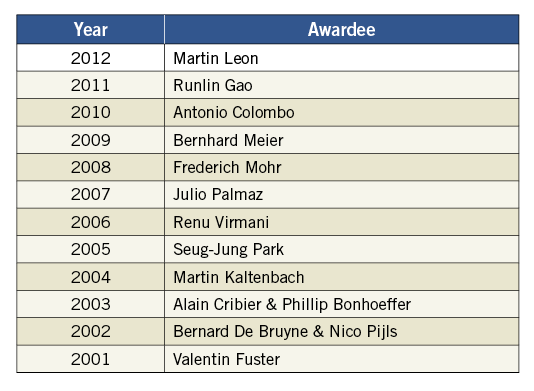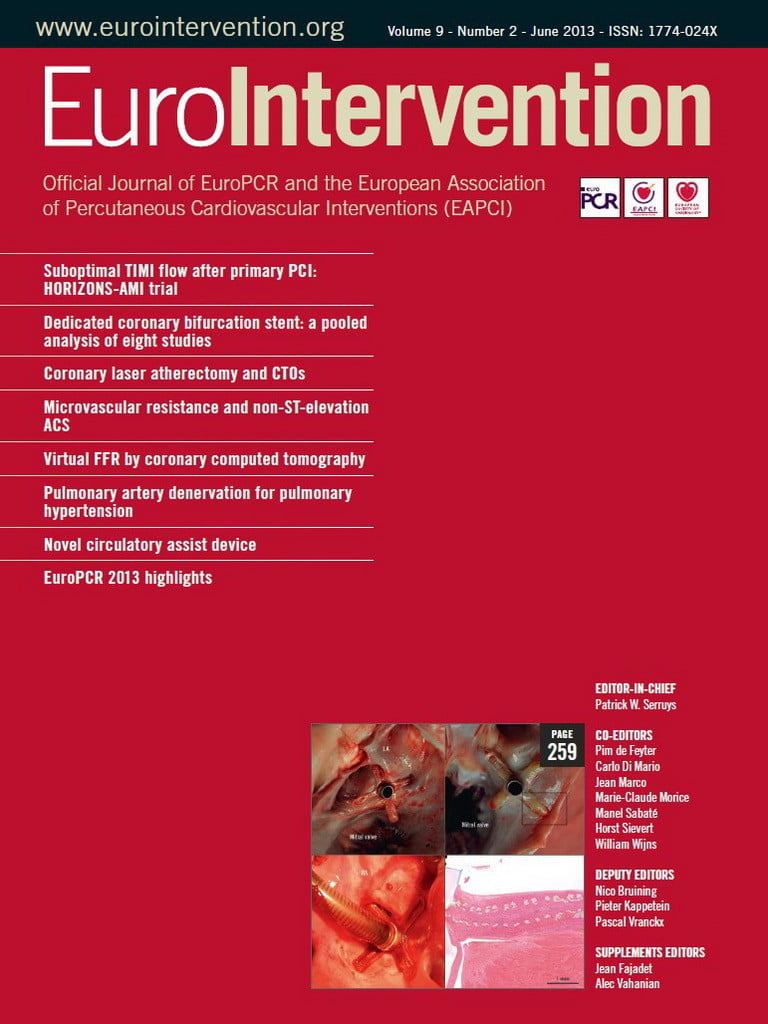Each year we bestow the ETHICA Award upon remarkable individuals who have significantly contributed to the field of cardiovascular intervention as either teachers, scientists, care providers, pioneers or, as is often the case, all of these at once.
This year’s Awardee clearly belongs to this exclusive group for many of these reasons, any of which would justify our selection.

The contributions of the Awardee to the field have been and remain essential to the durability, development and success of our practice.
These contributions have been present from the very beginning of Intervention back in the late seventies, and remain equally present –if not more decisively– today and for the future.
The commitment of the Awardee has been remarkable over the years, and equally massive has been the level of their entrepreneurial investment.
Although not all their efforts –by far– have been successful, there has been a constant and recurring series of innovative technologies which have become available that improve patient comfort, quality of life and outcomes.
One of the major achievements of this year’s Awardee has been the ability to resolve difficult technical challenges improving the efficacy and safety of interventions to the extent that our procedures have become a new mode of therapy, complementary to previously existing ones.
Last, but far from least in importance, is the “patient friendliness” of Cardiovascular Interventional Medicine, to which the Awardee has contributed immensely, setting new standards of care in response to our patients’ needs and demands.
And, as we have said, none of this could have happened without the contributions of the Awardee.
The Awardee has been relentless in its commitment to imaginative research and daring innovation. These innovations have translated into interventional therapies, but only after running through the intense cycle of invention, technical development, preclinical and clinical evaluation, validation, survey and trial in the real world.
By now, you must certainly have guessed that the Awardee is not a single individual … indeed …
The Awardee of the 2013 ETHICA Award is …

With this award we wish to recognise the Device Industry’s persistent drive for technological evolution; its research and development as a powerful engine leading to improved patient outcomes.
Who is the Device Industry?
Nearly 150 Medical Technology companies active in the cardiovascular sector are present at EuroPCR, and contribute to the innovation and technological progress of the field of interventional medicine.
A new patent application is filed every 38 minutes.
On the average, a product will be superseded by an improved version 18 to 24 months after it is first introduced.
More than 500,000 devices or diagnostic tools, with distinctive benefits for the diagnosed or treated patients, are available to healthcare professionals.
The societal impact of this sector is most important. Within healthcare expenditure in Europe, spending on medical technology represents no more than 4.2% of the overall budget; yet its impact is major.
In Europe alone, medical technology employs close to 500,000 people: 80% of the MedTech companies are small to medium size enterprises, with less than 250 employees.
Just taking into consideration the larger corporations by simply reading their annual reports, we see that a minimum of 15% of their revenues are spent on research & development, with many of our peers involved in the clinical assessment of these new technologies.
In addition, start-up companies are blossoming all over the world, with the sprouting of new pockets of innovation in the Asia Pacific region, Latin America, not to mention the US and Europe.
Gatherings such as EuroPCR and other PCR Courses provide living testimonials of all this activity, with passionate and dedicated R&D people from larger and smaller corporations –from China to the US, from Israel to Turkey– listening to clinicians, and devising which technologies could help us do a better job for our patients.
Why did we dare give this award to the Industry?
Medical technology is the lifeblood of our field.
The investment of the MedTech Industry in knowledge transfer is essential for patients, through optimised healthcare delivery.
Our field, interventional medicine, is the vivid demonstration that technology acts as an enabler of change.
We, as healthcare professionals, need to continue to engage with our industrial partners in a relationship that is both transparent and legitimate.
At PCR –at EuroPCR– since the very beginning, we have established a close dialogue between representatives of the practising medical community and the medical technology industry. The rules governing our interaction have always been clear and coherent with our core values: integrity, responsibility, excellence.
It is thanks to the contribution of the medical industry to courses such as EuroPCR that an unabashed commitment to the education of our community has been possible, in full scientific independence… That is perhaps one of the other remarkable contributions of the MedTech industry to the advancement of patient care: the belief in and support of better continuous medical education.
Why award the Device Industry, now?
We are facing serious challenges –of this I am sure we would all agree.
All stakeholders, policymakers, payers, healthcare professionals and institutions –as well as the public and industry– need to join forces in order to make a healthy future possible.
What are these challenges?
The equation has few, but critical variables.
There is an ever rising demand for health services because of demographics.
– Ageing of the population: in 2040, 30 to 40% of the European population will be over 65.
– With this ageing, the prevalence of all chronic diseases increases: 40% of Europeans over 50 suffer from two or more chronic diseases.
– No surprise that, after 55, the cost of healthcare doubles every 10 years.
At the same time public spending is under pressure and the number of taxpayers contributing to the public treasury is shrinking.
– One figure concerning this: the ratio of working people per pensioned European is expected to decrease from 3.6 to 1.7 between 2010 and 2050.
We need to join forces to implement solutions, and interventional medicine is part of the solution.
Device-based therapies are slowing the pace at which health spending is rising. In many clinical situations, less invasive procedures have become equally or more efficacious and safer than previous standards of care. As a result, medical technology has reduced hospital stays by 56% between 1980 and 2000.
These achievements are not trivial, but insufficiently publicised.
We need to pay more attention to measuring and demonstrating the economic and social benefits of our procedures. This is one of the key messages to take home from EuroPCR 2013.
Another key message is that we should reach out and engage with other disciplines, because only a true multidisciplinary approach can adequately respond to the needs of our elderly patients with multiple comorbidities.
The ETHICA Award refers to the legacy of Andreas Gruntzig, a legacy that has launched a new era of device-based therapies and translated into several new chapters in the history of medicine.
Thus, on May 21, 2013, we proudly bestowed the 2013 ETHICA Award to representatives of our partners from the Device Industry and Eucomed on behalf of the entire MedTech Industry and its tradition of research and development.
Together we, truly, achieve more …

